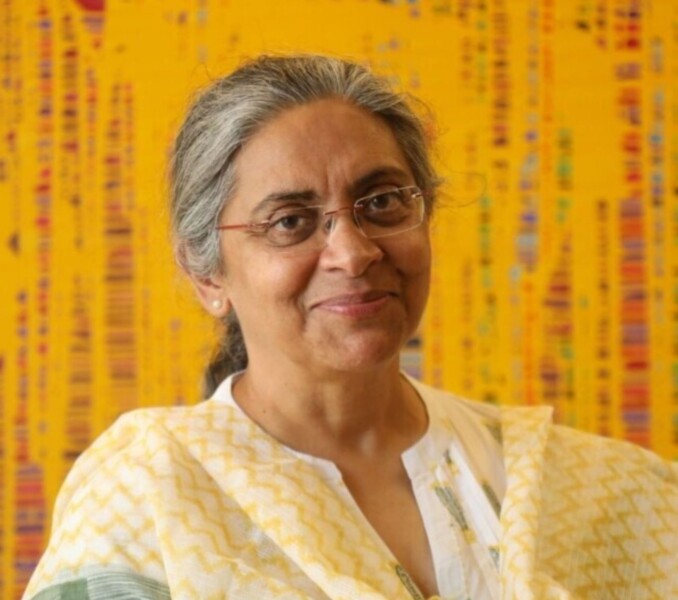CEO of Pratham Education Foundation writes powerful article, "The school of my dreams" for the Indian Express

This article was originally published by The Indian Express. You can read the full article here: ‘The school of my dreams’
It is a bright sunny Thursday morning — August 15, 2047. The school compound is packed with children and adults, current students, families and friends. There are also many others, those who have been part of this school community in past decades. On each side of the open courtyard is a big screen. People who are not here in person can link virtually to watch, participate and interact. Like always, right in the centre of the compound, on a tall pole, is the tricolour waiting to be hoisted and unfurled.
From the outside, the school building does not look different from before. But inside, it is very different. No longer can you see desks and benches in rows facing the blackboard. Now there are rooms with open space where teachers and children can organise themselves in whatever way they want. Grades have given way to stages. Libraries now have devices and tool kits that can be borrowed to take home. Laboratories are open for even young children to experiment and tinker.
A group of middle-aged women are on the stage. Twenty-five years ago, they had worked closely together. In the centre is the Standard I teacher from 2022 and her friend, the anganwadi instructor from that time. Around them are mothers, whose children were either in anganwadi or in the early grades more than two dozen years ago. From a distance, this group looks like a tight bunch of colourful flowers.
The women speak of a time, when a fearsome pandemic had shut schools for two years. Those were bad years. When the schools opened, everyone agreed that it was essential for young children to have strong foundations for future learning. Standard I and II teachers joined hands with the nearby anganwadi instructors and began to build this pathway. Mothers joined the effort, families engaged in fun learning activities with children at home and small groups of mothers met every week in their neighbourhood to discuss what more they could do together to strengthen their children’s learning, growth and development.
Since then, the village has not looked back. The path from anganwadi to school has become smoother and stronger over time. For many years now, little children enrol in first grade, confident and ready. One of the mothers invited her daughter on to the stage. The tall young lady who ran up the steps was in Standard I in 2022. Today in her early thirties, she is a surgeon in a nearby hospital. With gratitude, she embraced the women standing around her, for placing her on the road to success.
Next in line are children from the middle school stage. Their excitement is palpable even to those far away. The screens in the school yard are now showing a film made by these children. It is about water in the village. In middle school nowadays, groups of students work together, to identify a problem in the community, understand it and work towards a solution. Moving well beyond the confines of the textbook, using real life situations to learn, is now the norm. Over the years, rainfall had become erratic and uncertain. Middle school children had been tracking changes over time. They are currently working with adults to develop water storage solutions that could help everyone in the dry months.
Older students had been patiently waiting their turn. Once on stage, they speak of their time in high school. One student laughs, as she recounts how difficult her father’s life had been; his entire time in high school was dominated by exams and his life afterwards dependent solely on his exam result.
Luckily, this does not happen anymore. The young girl explains — she can take any exam online anytime, whenever she feels ready. “We use ATM” she says proudly, “the Anytime Testing Machine”. She smiles some more. “My father is jealous that exams are not high stakes any more. Today, there are so many ways to move ahead.” For example, she and a few friends had been experimenting with small business ideas. The school provided a bit of seed funding and a lot of encouragement and guidance. From the stage, she invited people of the village to look at their AI-generated movies based on stories of individual clients.
It was now time to raise the flag. Fluttering in the breeze, the tricolour looked down proudly on the school below. Let us close our eyes and imagine. Every child must be able to explore her interests and to discover her own potential. Keeping all children in mind, schools, families and communities must ensure building strong foundations, developing choices for pathways and opportunities for learning.
We need to work systematically and persistently, building on what has worked each year, learning from what did not, experimenting with what is needed but perhaps still just out of reach, navigating around obstacles and tracking progress. The school has to be the anchor of community life, leveraging the past, building the present and planning for a better future. If our heads, hearts and hands come together, it is possible that every school on August 15, 2047 will be celebrating like the one we are reading about now.
Find out more about Pratham UK’s learning programmes and how you can get involved in helping to change a child’s life through education.
